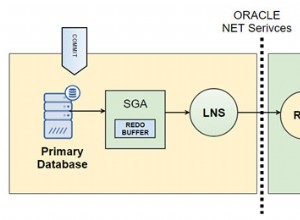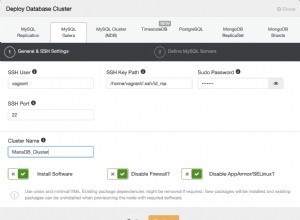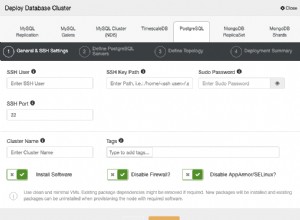W porządku, napisałem migrację, aby osiągnąć to w moim własnym systemie.
-
Pozwala opcjonalnie określić nazwę połączenia, aby odwoływać się do połączenia innego niż domyślne.
-
Pobiera listę tabel z bazy danych połączenia za pomocą polecenia
SHOW TABLESzapytanie. -
Następnie przechodzi przez każdą tabelę w pętli i aktualizuje wszystkie kolumny typu ciąg/znak do nowego zestawu znaków i sortowania.
-
Zrobiłem to tak, że musi być dostarczone wywołanie zwrotne, aby określić, czy kolumna powinna mieć zmienioną długość na podaną nową długość. W mojej implementacji
VARCHARiCHARkolumny o długości większej niż 191 są aktualizowane do długości 191 podczas migracji w górę iVARCHARiCHARkolumny o długości dokładnie 191 są aktualizowane do długości 255 podczas migracji wstecznej/w dół. -
Po zaktualizowaniu wszystkich kolumn napisów/znaków, kilka zapytań zostanie uruchomionych w celu zmiany zestawu znaków i kolacji tabeli, konwersji wszelkich pozostałych kolacji na nowe, a następnie zmiany domyślnego zestawu znaków i kolacji tabeli.
-
Na koniec domyślny zestaw znaków i sortowanie bazy danych zostaną zmienione.
Notatki
-
Początkowo próbowałem po prostu przekonwertować tabele na nowe kodowanie, ale napotkałem problemy z długościami kolumn. 191 znaków to maksymalna długość znaków w
utf8mb4podczas używania InnoDB w mojej wersji MySQL/MariaDB i zmiana sortowania tabeli spowodowała błąd. -
Na początku chciałem tylko zaktualizować długości do nowej długości, ale chciałem również zapewnić funkcję wycofywania, więc nie było to możliwe, ponieważ w odwrotnej metodzie ustawiałbym długości kolumn, które byłyby
utf8mb4do 255, co byłoby zbyt długie, więc zdecydowałem się również na zmianę sortowania. -
Następnie próbowałem po prostu zmienić długość, zestaw znaków i sortowanie
varcharicharkolumny, które były zbyt długie, ale w moim systemie powodowało to błędy, gdy miałem indeksy wielokolumnowe, które zawierały takie kolumny. Najwyraźniej indeksy wielokolumnowe muszą używać tego samego sortowania. -
Ważna uwaga na tym polega to, że migracja odwrotna/w dół nie będzie w 100% idealna dla wszystkich. Nie sądzę, że byłoby to możliwe bez przechowywania dodatkowych informacji o oryginalnych kolumnach podczas migracji. Tak więc moja obecna implementacja migracji wstecznej/w dół zakłada, że kolumny o długości 191 miały pierwotnie 255.
-
Podobnie ważna uwaga na tym polega to, że spowoduje to ślepą zmianę sortowania wszystkich kolumn ciągów/znaków na nowe sortowanie, niezależnie od pierwotnego sortowania, więc jeśli istnieją kolumny z różnymi sortowaniami, wszystkie zostaną przekonwertowane na nowe i zrobi to na odwrót to samo, oryginały nie zostaną zachowane.
<?php
use Illuminate\Database\Migrations\Migration;
class UpgradeDatabaseToUtf8mb4 extends Migration
{
/**
* Run the migrations.
*
* @return void
*/
public function up()
{
$this->changeDatabaseCharacterSetAndCollation('utf8mb4', 'utf8mb4_unicode_ci', 191, function ($column) {
return $this->isStringTypeWithLength($column) && $column['type_brackets'] > 191;
});
}
/**
* Reverse the migrations.
*
* @return void
*/
public function down()
{
$this->changeDatabaseCharacterSetAndCollation('utf8', 'utf8_unicode_ci', 255, function ($column) {
return $this->isStringTypeWithLength($column) && $column['type_brackets'] == 191;
});
}
/**
* Change the database referred to by the connection (null is the default connection) to the provided character set
* (e.g. utf8mb4) and collation (e.g. utf8mb4_unicode_ci). It may be necessary to change the length of some fixed
* length columns such as char and varchar to work with the new encoding. In which case the new length of such
* columns and a callback to determine whether or not that particular column should be altered may be provided. If a
* connection other than the default connection is to be changed, the string referring to the connection may be
* provided as the last parameter (This string will be passed to DB::connection(...) to retrieve an instance of that
* connection).
*
* @param string $charset
* @param string $collation
* @param null|int $newColumnLength
* @param Closure|null $columnLengthCallback
* @param string|null $connection
*/
protected function changeDatabaseCharacterSetAndCollation($charset, $collation, $newColumnLength = null, $columnLengthCallback = null, $connection = null)
{
$tables = $this->getTables($connection);
foreach ($tables as $table) {
$this->updateColumnsInTable($table, $charset, $collation, $newColumnLength, $columnLengthCallback, $connection);
$this->convertTableCharacterSetAndCollation($table, $charset, $collation, $connection);
}
$this->alterDatabaseCharacterSetAndCollation($charset, $collation, $connection);
}
/**
* Get an instance of the database connection provided with an optional string referring to the connection. This
* should be null if referring to the default connection.
*
* @param string|null $connection
*
* @return \Illuminate\Database\Connection
*/
protected function getDatabaseConnection($connection = null)
{
return DB::connection($connection);
}
/**
* Get a list of tables on the provided connection.
*
* @param null $connection
*
* @return array
*/
protected function getTables($connection = null)
{
$tables = [];
$results = $this->getDatabaseConnection($connection)->select('SHOW TABLES');
foreach ($results as $result) {
foreach ($result as $key => $value) {
$tables[] = $value;
break;
}
}
return $tables;
}
/**
* Given a stdClass representing the column, extract the required information in a more accessible format. The array
* returned will contain the field name, the type of field (Without the length), the length where applicable (or
* null), true/false indicating the column allowing null values and the default value.
*
* @param stdClass $column
*
* @return array
*/
protected function extractInformationFromColumn($column)
{
$type = $column->Type;
$typeBrackets = null;
$typeEnd = null;
if (preg_match('/^([a-z]+)(?:\\(([^\\)]+?)\\))?(.*)/i', $type, $matches)) {
$type = strtolower(trim($matches[1]));
if (isset($matches[2])) {
$typeBrackets = trim($matches[2]);
}
if (isset($matches[3])) {
$typeEnd = trim($matches[3]);
}
}
return [
'field' => $column->Field,
'type' => $type,
'type_brackets' => $typeBrackets,
'type_end' => $typeEnd,
'null' => strtolower($column->Null) == 'yes',
'default' => $column->Default,
'charset' => is_string($column->Collation) && ($pos = strpos($column->Collation, '_')) !== false ? substr($column->Collation, 0, $pos) : null,
'collation' => $column->Collation
];
}
/**
* Tell if the provided column is a string/character type and needs to have it's charset/collation changed.
*
* @param string $column
*
* @return bool
*/
protected function isStringType($column)
{
return in_array(strtolower($column['type']), ['char', 'varchar', 'tinytext', 'text', 'mediumtext', 'longtext', 'enum', 'set']);
}
/**
* Tell if the provided column is a string/character type with a length.
*
* @param string $column
*
* @return bool
*/
protected function isStringTypeWithLength($column)
{
return in_array(strtolower($column['type']), ['char', 'varchar']);
}
/**
* Update all of the string/character columns in the database to be the new collation. Additionally, modify the
* lengths of those columns that have them to be the newLength provided, when the shouldUpdateLength callback passed
* returns true.
*
* @param string $table
* @param string $charset
* @param string $collation
* @param int|null $newLength
* @param Closure|null $shouldUpdateLength
* @param string|null $connection
*/
protected function updateColumnsInTable($table, $charset, $collation, $newLength = null, Closure $shouldUpdateLength = null, $connection = null)
{
$columnsToChange = [];
foreach ($this->getColumnsFromTable($table, $connection) as $column) {
$column = $this->extractInformationFromColumn($column);
if ($this->isStringType($column)) {
$sql = "CHANGE `%field%` `%field%` %type%%brackets% CHARACTER SET %charset% COLLATE %collation% %null% %default%";
$search = ['%field%', '%type%', '%brackets%', '%charset%', '%collation%', '%null%', '%default%'];
$replace = [
$column['field'],
$column['type'],
$column['type_brackets'] ? '(' . $column['type_brackets'] . ')' : '',
$charset,
$collation,
$column['null'] ? 'NULL' : 'NOT NULL',
is_null($column['default']) ? ($column['null'] ? 'DEFAULT NULL' : '') : 'DEFAULT \'' . $column['default'] . '\''
];
if ($this->isStringTypeWithLength($column) && $shouldUpdateLength($column) && is_int($newLength) && $newLength > 0) {
$replace[2] = '(' . $newLength . ')';
}
$columnsToChange[] = trim(str_replace($search, $replace, $sql));
}
}
if (count($columnsToChange) > 0) {
$query = "ALTER TABLE `{$table}` " . implode(', ', $columnsToChange);
$this->getDatabaseConnection($connection)->update($query);
}
}
/**
* Get a list of all the columns for the provided table. Returns an array of stdClass objects.
*
* @param string $table
* @param string|null $connection
*
* @return array
*/
protected function getColumnsFromTable($table, $connection = null)
{
return $this->getDatabaseConnection($connection)->select('SHOW FULL COLUMNS FROM ' . $table);
}
/**
* Convert a table's character set and collation.
*
* @param string $table
* @param string $charset
* @param string $collation
* @param string|null $connection
*/
protected function convertTableCharacterSetAndCollation($table, $charset, $collation, $connection = null)
{
$query = "ALTER TABLE {$table} CONVERT TO CHARACTER SET {$charset} COLLATE {$collation}";
$this->getDatabaseConnection($connection)->update($query);
$query = "ALTER TABLE {$table} DEFAULT CHARACTER SET {$charset} COLLATE {$collation}";
$this->getDatabaseConnection($connection)->update($query);
}
/**
* Change the entire database's (The database represented by the connection) character set and collation.
*
* # Note: This must be done with the unprepared method, as PDO complains that the ALTER DATABASE command is not yet
* supported as a prepared statement.
*
* @param string $charset
* @param string $collation
* @param string|null $connection
*/
protected function alterDatabaseCharacterSetAndCollation($charset, $collation, $connection = null)
{
$database = $this->getDatabaseConnection($connection)->getDatabaseName();
$query = "ALTER DATABASE {$database} CHARACTER SET {$charset} COLLATE {$collation}";
$this->getDatabaseConnection($connection)->unprepared($query);
}
}
Proszę, proszę, utwórz kopię zapasową bazy danych przed uruchomieniem tego . Używaj na własne ryzyko!




